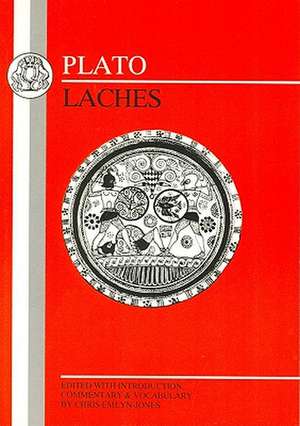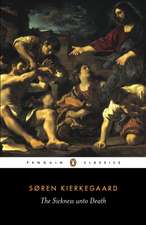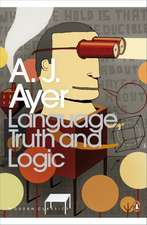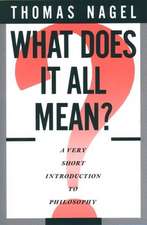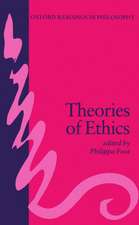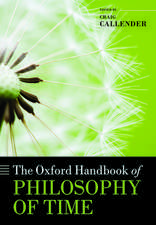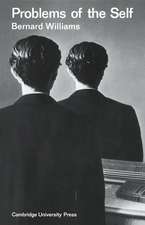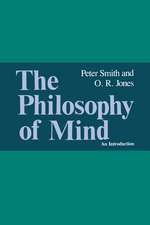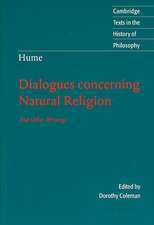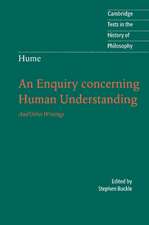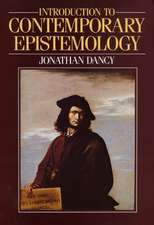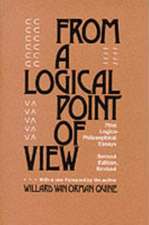Plato: Laches: Greek Texts
Editat de Chris Emlyn-Jones Autor Plato Dr C.J. Emlyn-Jonesen Limba Engleză Paperback – 31 dec 1997
Din seria Greek Texts
- 13%
 Preț: 200.89 lei
Preț: 200.89 lei - 17%
 Preț: 241.71 lei
Preț: 241.71 lei - 17%
 Preț: 253.67 lei
Preț: 253.67 lei - 20%
 Preț: 171.64 lei
Preț: 171.64 lei - 14%
 Preț: 171.85 lei
Preț: 171.85 lei - 15%
 Preț: 148.82 lei
Preț: 148.82 lei - 14%
 Preț: 151.94 lei
Preț: 151.94 lei - 13%
 Preț: 199.91 lei
Preț: 199.91 lei - 14%
 Preț: 198.74 lei
Preț: 198.74 lei - 13%
 Preț: 146.36 lei
Preț: 146.36 lei - 14%
 Preț: 164.50 lei
Preț: 164.50 lei - 14%
 Preț: 152.01 lei
Preț: 152.01 lei - 15%
 Preț: 142.89 lei
Preț: 142.89 lei - 6%
 Preț: 143.66 lei
Preț: 143.66 lei - 14%
 Preț: 196.44 lei
Preț: 196.44 lei -
 Preț: 150.33 lei
Preț: 150.33 lei - 14%
 Preț: 150.50 lei
Preț: 150.50 lei - 14%
 Preț: 196.61 lei
Preț: 196.61 lei - 20%
 Preț: 149.16 lei
Preț: 149.16 lei - 14%
 Preț: 164.40 lei
Preț: 164.40 lei - 8%
 Preț: 197.68 lei
Preț: 197.68 lei - 13%
 Preț: 199.64 lei
Preț: 199.64 lei - 20%
 Preț: 141.46 lei
Preț: 141.46 lei - 13%
 Preț: 199.73 lei
Preț: 199.73 lei - 19%
 Preț: 143.06 lei
Preț: 143.06 lei - 7%
 Preț: 200.08 lei
Preț: 200.08 lei - 14%
 Preț: 144.47 lei
Preț: 144.47 lei - 14%
 Preț: 151.47 lei
Preț: 151.47 lei - 7%
 Preț: 163.08 lei
Preț: 163.08 lei
Preț: 151.38 lei
Preț vechi: 175.91 lei
-14% Nou
Puncte Express: 227
Preț estimativ în valută:
28.97€ • 30.31$ • 24.06£
28.97€ • 30.31$ • 24.06£
Carte tipărită la comandă
Livrare economică 02-16 aprilie
Preluare comenzi: 021 569.72.76
Specificații
ISBN-13: 9781853994111
ISBN-10: 1853994111
Pagini: 128
Dimensiuni: 147 x 210 x 9 mm
Greutate: 0.25 kg
Ediția:Nouă
Editura: Bloomsbury Publishing
Colecția Bristol Classical Press
Seria Greek Texts
Locul publicării:London, United Kingdom
ISBN-10: 1853994111
Pagini: 128
Dimensiuni: 147 x 210 x 9 mm
Greutate: 0.25 kg
Ediția:Nouă
Editura: Bloomsbury Publishing
Colecția Bristol Classical Press
Seria Greek Texts
Locul publicării:London, United Kingdom
Caracteristici
The simplicity of language is accessible to students with just one or two year's Greek learning
Notă biografică
Chris Emlyn-Jones is Senior Lecturer in Classical Studies at the Open university, and produces distance learning multi-media undergraduate courses in Greek and Roman Cutlure. His publications include Plato: Euthyphro (1991) and Homer: Reading and Images (1992).
Cuprins
PrefaceNotes on this EditionIntroductionLaches: setting and contextThe dramatic structureThe argumentative structureThe meaning and significance of lAchesLaches: synopsis and formal structureTextCommentaryBibliographyVocabulary
Descriere
This edition of Plato's "Laches" is part of the "Bristol Classical Press Greek Texts" series.
Recenzii
"This trio from St. John's has produced the most high-fidelity English translation of the Meno available. The Introduction offers a no-nonsense summary of the dialogue, and ample footnotes alert the reader to important Greek terms, while also situating significant claims in their historical context as well as in the context of Plato's larger corpus. The Glossary helpfully places the focus on core philosophical concepts, and the Select Bibliography makes for a manageable introduction to some of the standard scholarship. This volume is an all-around success." Charles Ives, University of Washington
"This gem of a dialogue is elegantly rendered into English, masterfully achieving the twin goals of illuminating the Greek and speaking to a modern audience. In its fifth translation of a Platonic dialogue, the team of Brann, Kalkavage, and Salem is at the top of its craft, bringing alive this important Platonic dialogue in search of a definition of virtue." Stephen Scully, Boston University
"The translation stays close to the Greek while remaining clear and lively, allowing the reader to become absorbed in the drama without losing any of the provocative details of the original. The notes provide new and experienced readers with powerful tools for better appreciating both the task of the translator and the drama of the exchange between the characters. This is a first-rate volume for engaging each of the themes raised in the Meno while offering help pulling them all together. It is an excellent point of entry into Platonic dialogues and into philosophy generally, in fine Socratic spirit." Eric Sanday, University of Kentucky
"The appearance of a new translation of a Platonic dialogue by Eva Brann, Peter Kalkavage, and Eric Salem for the Focus Philosophical Library is always exciting, and this edition of the Meno does not disappoint. The translation is highly praiseworthy for its fidelity and lucidity, accurately capturing the vocabulary of the Greek while presenting the text in an engaging, colloquial form that places it among the best English translations of Plato. The book's value is increased by an authoritative but concise introductory overview of the dialogue, extensive historical and linguistic footnotes, and detailed geometric diagrams set directly within the text, rather than in an appendix. These virtues, along with its affordable cost, make this edition a must-have for scholars and an excellent choice for teaching at all levels." Colin C. Smith, Pennsylvania State University, in Bryn Mawr Classical Review
"As one would expect from the team of Brann, Kalkavage and Salem, their edition of Plato's Meno is a fine one. The translation meets their stated goal of remaining 'as faithful as possible to the Greek, while using lively, colloquial English.' Their notes are consistently helpful and will be particularly useful to those readers willing to explore the nuances of Plato's extraordinary prose. Their introduction is clear and compact, and it highlights the most philosophically important themes of the dialogue. One particularly useful feature of this edition is the manner in which it displays the diagrams Socrates draws in order to illustrate his famous 'square within a square.' Instead of relegating them to the notes, it integrates them into the text of the dialogue itself. Readers are able to follow along, and 'watch' Socrates actually construct them." David Roochnik, Boston University
"This gem of a dialogue is elegantly rendered into English, masterfully achieving the twin goals of illuminating the Greek and speaking to a modern audience. In its fifth translation of a Platonic dialogue, the team of Brann, Kalkavage, and Salem is at the top of its craft, bringing alive this important Platonic dialogue in search of a definition of virtue." Stephen Scully, Boston University
"The translation stays close to the Greek while remaining clear and lively, allowing the reader to become absorbed in the drama without losing any of the provocative details of the original. The notes provide new and experienced readers with powerful tools for better appreciating both the task of the translator and the drama of the exchange between the characters. This is a first-rate volume for engaging each of the themes raised in the Meno while offering help pulling them all together. It is an excellent point of entry into Platonic dialogues and into philosophy generally, in fine Socratic spirit." Eric Sanday, University of Kentucky
"The appearance of a new translation of a Platonic dialogue by Eva Brann, Peter Kalkavage, and Eric Salem for the Focus Philosophical Library is always exciting, and this edition of the Meno does not disappoint. The translation is highly praiseworthy for its fidelity and lucidity, accurately capturing the vocabulary of the Greek while presenting the text in an engaging, colloquial form that places it among the best English translations of Plato. The book's value is increased by an authoritative but concise introductory overview of the dialogue, extensive historical and linguistic footnotes, and detailed geometric diagrams set directly within the text, rather than in an appendix. These virtues, along with its affordable cost, make this edition a must-have for scholars and an excellent choice for teaching at all levels." Colin C. Smith, Pennsylvania State University, in Bryn Mawr Classical Review
"As one would expect from the team of Brann, Kalkavage and Salem, their edition of Plato's Meno is a fine one. The translation meets their stated goal of remaining 'as faithful as possible to the Greek, while using lively, colloquial English.' Their notes are consistently helpful and will be particularly useful to those readers willing to explore the nuances of Plato's extraordinary prose. Their introduction is clear and compact, and it highlights the most philosophically important themes of the dialogue. One particularly useful feature of this edition is the manner in which it displays the diagrams Socrates draws in order to illustrate his famous 'square within a square.' Instead of relegating them to the notes, it integrates them into the text of the dialogue itself. Readers are able to follow along, and 'watch' Socrates actually construct them." David Roochnik, Boston University
